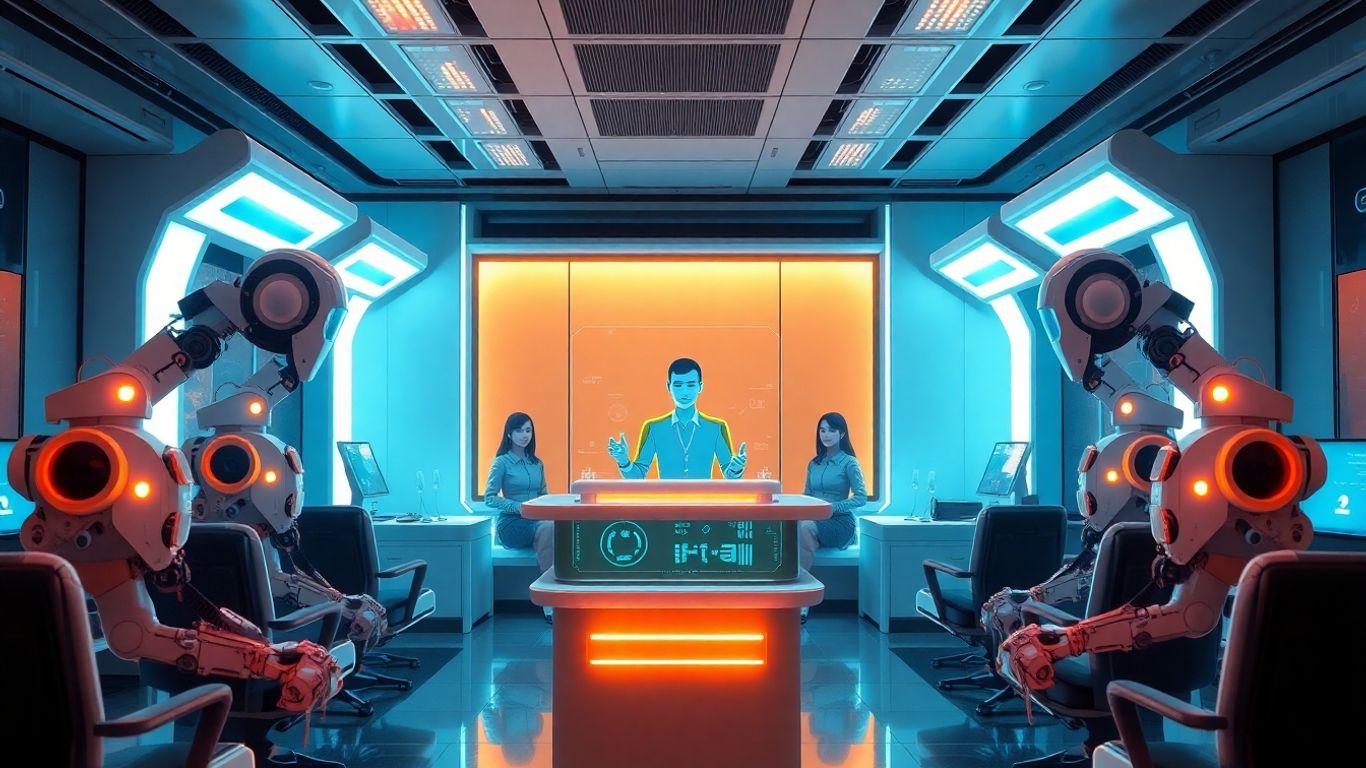Call centers are changing, and it's all thanks to AI and automation. For years, businesses have been looking for ways to handle more customer questions without hiring a ton of people or making customers wait forever on hold. Now, it looks like AI is stepping up to the plate. This isn't just about chatbots answering simple questions; it's about smarter systems that can do a lot more, making things easier for both the company and the person calling in. We're talking about AI and automation in call centers becoming the new normal.

It feels like just yesterday we were all stuck on hold, listening to that tinny music, wondering if anyone would ever pick up. Call centers have always been a bit of a necessary evil, right? They handle our problems, but often with long waits and a general sense of frustration. But things are changing, and fast. Artificial intelligence, or AI, is stepping in, and it's not just tweaking things; it's completely reshaping how customer service works.
So, what exactly are we talking about when we say "AI-driven call center operations"? It's basically using smart computer programs to handle customer interactions. Think of it as giving your support team a super-powered assistant that can do a lot of the heavy lifting. These systems use things like natural language processing (NLP) to understand what people are saying, machine learning to get smarter over time, and automation to handle repetitive tasks. The goal isn't just to replace people, but to make the whole process smoother, faster, and frankly, less annoying for everyone involved.
There are a few big players in the AI world that are making a real difference:
Remember the old days? A customer calls, a human answers, they try to solve the problem. If they can't, they transfer you, maybe to another department, and you start all over. It was clunky. AI changes this by creating a more connected experience. Instead of just reacting to problems, AI can anticipate them. It can route calls more intelligently, provide agents with instant customer history, and even offer self-service options that actually work. This shift means moving from a reactive support model to a proactive, personalized one.
The integration of AI isn't just about making call centers more efficient; it's about fundamentally rethinking the customer journey. It's about being there for customers not just when they have a problem, but before they even realize they might have one.

Let's be honest, nobody enjoys the repetitive, mind-numbing tasks that can bog down a call center. Think about answering the same basic questions over and over, or manually logging every single interaction. It's not just boring for the agents; it's a huge drain on resources and time that could be spent on more important things. This is where automation really shines, stepping in to handle the grunt work so your human team can focus on what they do best.
AI-powered systems are fantastic at taking over those high-volume, predictable tasks. We're talking about things like password resets, checking account balances, scheduling appointments, or providing order updates. By letting AI handle these, you can see a significant drop in the number of calls agents need to pick up for simple queries. Some reports suggest this can reduce routine call volume by 30-50%. Imagine what your agents could do with that extra time – tackling complex problems, offering more personalized support, or even just taking a much-needed breather.
Automating the mundane allows your skilled agents to concentrate on interactions that truly require human judgment, creativity, and empathy. This shift not only improves efficiency but also boosts job satisfaction.
Beyond just individual tasks, automation can completely revamp how your call center operates. Intelligent routing, for example, uses AI to analyze a customer's needs and then sends them directly to the agent best equipped to help. This means fewer transfers, quicker resolutions, and happier customers. AI can also assist agents in real-time, popping up with relevant customer information or suggesting the next best step during a call. This cuts down on research time and makes agents more effective. It’s like giving every agent a super-smart assistant who knows everything about the customer and the company's products.
When agents are constantly swamped with repetitive tasks or struggling to find information, burnout is almost inevitable. Automation acts as a pressure release valve. By taking over the tedious parts of the job and providing instant support, AI helps reduce the daily grind. This leads to less stress, fewer errors, and a more positive work environment. When agents feel supported and can focus on meaningful interactions, they're more likely to stay engaged and provide better service. It’s a win-win: agents are happier, and customers get better support. You can explore AI solutions that handle customer interactions, like AI-powered phone agents that automate outbound calls and manage inquiries, freeing up your human team.
So, how does all this AI stuff actually make things better for the people calling in? It's not just about making things faster for the company, though that's part of it. Think about it: no one likes being put on hold forever, right? AI helps cut down those wait times by being smarter about who gets routed where. It's like having a super-efficient greeter who knows exactly who can help you best, right from the start.
And it's not just about speed. AI can actually make the whole interaction feel more personal. It can pull up your history, remember what you talked about last time, and even figure out if you're having a rough day based on how you're talking. This means the person helping you (whether it's a human or an AI) can tailor their approach to you specifically. It makes you feel like they actually get you, instead of just reading from a script.
Remember when customer service felt like a one-size-fits-all deal? AI is changing that. It looks at your past interactions, what you've bought, and even how you tend to communicate. Then, it uses that info to make your current conversation feel more like a chat with someone who knows you. This means getting advice or solutions that actually fit your situation, not just a generic answer. It’s about making each customer feel seen and heard, which is a big deal.
Nobody enjoys the sound of hold music. AI is a game-changer here. Instead of just sending your call to the next available person, AI looks at what you need and matches you with the agent who has the right skills to solve your problem quickly. This smart routing means you're less likely to get bounced around and more likely to get your issue sorted on the first try. It’s all about getting you to the right help, faster.
Sometimes, you just want to quickly check your balance or find out about a return policy without talking to anyone. AI makes these self-service options way better than the old, clunky automated menus. You can often just ask your question in plain English, and the AI can understand and help you out. It’s like having a helpful assistant available 24/7 for those common questions, freeing up human agents for the trickier stuff. This means you get your answer quickly, and the company can handle more complex issues more effectively.
Remember the old days of call centers? You'd call, get put on hold, and then maybe, just maybe, get transferred to someone who could actually help. It was a bit of a lottery, wasn't it? Well, AI is changing all of that with intelligent call routing. It's not just about sending calls anywhere; it's about sending them to the right place, the first time.
AI looks at a bunch of stuff before deciding where your call should go. It checks who you are, what you're calling about, and even how you're feeling based on your voice. Then, it matches all that info with the skills and availability of your agents. This means fewer transfers and a much smoother experience for you.
This is where AI really shines. Instead of a simple first-in, first-out system, AI acts like a super-smart matchmaker. It understands that not all agents are created equal for every situation. Some might be whizzes at de-escalating angry customers, while others are experts in complex product troubleshooting. AI uses this knowledge to connect you with the person most likely to solve your problem quickly and effectively.
The goal is to move beyond simply answering calls to actively solving problems. By intelligently routing each interaction, AI ensures that the customer's time is respected and their issue is addressed by the most capable resource available from the start.
When you get routed to the right person the first time, you're much more likely to have your issue resolved without needing to call back. This is what we call First-Call Resolution (FCR), and it's a big deal for customer satisfaction. AI's ability to analyze caller needs and agent skills means fewer dropped calls, less frustration, and happier customers who feel like their time and problem were taken seriously.
Call centers churn out a ton of data, right? But if you're not looking at it right, it's just noise. Manually sifting through calls, chats, and emails to figure out what customers are really saying or what keeps going wrong? Forget about it. It takes forever and you'll probably miss the important stuff.
This is where AI steps in. It can actually process all that information super fast, giving you clear ideas on how to make things better. AI tools can listen in on calls and tell you if a customer is getting frustrated, so agents can change their approach on the fly. It also pulls together info from everywhere – calls, texts, emails – to spot those annoying issues that keep popping up. This means you can fix problems before they even start and just generally make service way smoother.
Ever wish you had a crystal ball to know how a customer feels during a call? AI gets pretty close. It can analyze tone of voice, word choice, and even pauses to gauge sentiment. If it detects frustration or confusion, it can flag it for the agent. This lets the agent adjust their style, maybe slow down, offer more reassurance, or escalate the issue if needed. It's like having a little nudge to make sure the customer feels heard.
AI is brilliant at spotting patterns that humans might miss. It can go through thousands of customer interactions and notice that a lot of people are asking the same question about a new product feature, or that a specific step in your online checkout process is causing trouble. Instead of just dealing with each complaint as it comes, AI helps you see the bigger picture. You can then address the root cause, whether that's updating your website FAQ, improving a product, or retraining staff on a particular topic.
Forget gut feelings. AI analytics give you the hard facts to back up your decisions. You can see which types of calls take the longest to resolve, which agents are excelling and why, or where customers are dropping off in the self-service process. This information lets you make smart changes. Maybe you need more training on a certain topic, or perhaps a particular automated workflow isn't working as well as you thought. It's all about using what the data tells you to make service better, more efficient, and more customer-friendly.

Remember when businesses used to worry about phone lines like they were made of gold? "Oh no, all our lines are busy!" they'd cry, as if Alexander Graham Bell himself had personally limited them to five calls at once. Well, we fixed that. Our AI receptionist doesn't just handle multiple calls. It handles ALL the calls. At once. Forever. It's like we gave it an infinite supply of ears and an attention span that would make a zen master jealous.
What makes this capability so cool? It's scalability on steroids, consistency that would make a Swiss watch blush, and the fact that "busy signal" is now as obsolete as the floppy disk. Our AI doesn't just handle calls, it tidies them up and thanks them for sparking joy. Peak periods? More like "meh" periods. Black Friday, the Super Bowl commercial just aired, a zombie apocalypse? Bring it on. This feature is like giving your business a superpower. It's the kind of thing that makes you wonder how you ever lived without it. It's like smartphones.
Why should you care about this kind of scalability? Because it means happy customers, your business stays alive even when that influencer accidentally puts your phone number in their Instagram story, and you can scale without the growing pains. Your brand consistency remains intact whether it's the first call of the day or the ten thousandth. Plus, every call becomes an insight, like some sort of customer service Pokémon trainer catching them all. Imagine your product goes viral and thousands of calls pour in. Your AI doesn't break a sweat. It's like the phone equivalent of that "This is fine" meme dog, except everything actually is fine.
If your service goes down and angry customers flood the lines, your AI handles it so well, they hang up wondering if they should apologize to you. When you go global, your AI juggles time zones like a cosmic deity. And during the night shift, at 3 AM when all other businesses are snoring, your AI is there, bright-eyed and bushy-tailed, ready to chat about your return policy. The system allows for complex scenarios, understanding nuanced conversations. It works for inbound calls, enhancing customer interactions by providing timely information without interrupting the call flow. This feature leverages AI to automate text message sending based on call content, improving efficiency and customer experience.
The speed of thought matters in conversation. Our AI receptionist is fast, responding in milliseconds. This speed isn't just a neat trick; it's transformative, turning potentially frustrating interactions into smooth, natural conversations. It's like talking to a hyper-competent human who never needs to pause to think.
So, you've got this fancy AI system ready to rock your call center, but what happens next? It's not just about plugging it in and hoping for the best. The real magic happens when this AI plays nice with all the other tools you're already using. Think of it like building a team – you want everyone to work together smoothly, right? That's where integration comes in.
This is a big one. Your AI needs to talk to your scheduling software and your Customer Relationship Management (CRM) system. Why? Because when your AI answers a call, it should be able to see who's calling (thanks, CRM!) and maybe even book a follow-up appointment directly into your calendar (hello, scheduling tool!). It’s not just about answering questions; it’s about making the whole process flow. For example, Frontdesk can connect with a ton of different apps, making sure that when your AI receptionist handles a lead, that lead's info gets straight into your sales system without you lifting a finger. This means less manual data entry and fewer chances for things to slip through the cracks.
It's not a one-way street, though. The best systems allow for two-way communication. So, not only can the AI pull information from your CRM, but it can also push new information back into it. Imagine your AI handles a customer query, updates their profile in the CRM with the details of the conversation, and then flags it for a human agent if a follow-up is needed. This keeps all your data current and gives your human team the full picture. It’s like having a super-organized assistant who updates all your records automatically after every interaction.
This is where things get really interesting. The AI can actually do things based on what's said during a call or what happens next. For instance, if a customer mentions needing a specific service, the AI could automatically create a service ticket. Or, if a call ends and the customer expressed interest in a product, the AI could trigger an automated follow-up email or text message. This level of automation means routine tasks get handled without human intervention, freeing up your team for more complex issues. It's about making the AI work for you, not just with you.
The goal is to create a connected ecosystem where AI acts as a central hub, orchestrating tasks and information across different platforms. This reduces manual work, speeds up processes, and ensures consistency, ultimately making your entire operation run much more smoothly.

Implementing AI in your call center isn't just about fancy tech; it's a smart financial move. Think about all those repetitive questions customers ask. AI can handle a huge chunk of those, freeing up your human agents for more complex issues. This means you can potentially manage a growing number of customer interactions without needing to hire more people, which directly cuts down on staffing costs, training expenses, and overhead. It's like having a super-efficient assistant who works 24/7 without needing breaks or benefits.
Studies show that businesses adopting AI in their call centers often see a solid return on their investment. We're talking about potential cost reductions of 20-30% in operational expenses. This comes from things like shorter average call times and better first-call resolution rates, meaning customers get their problems solved faster. When customers are happy and issues are resolved quickly, it also leads to fewer repeat calls, further saving time and resources. The financial benefits are clear: AI helps you do more with less.
One of the biggest wins with AI is its ability to scale. Imagine your business suddenly gets a lot more popular, or a big event causes a surge in calls. Instead of scrambling to hire and train temporary staff, your AI system can handle the increased volume. It can manage thousands of calls simultaneously without getting overwhelmed. This flexibility means you can grow your business and serve more customers during peak times without your costs skyrocketing in proportion to your staff size. It's about smart growth, not just growth for growth's sake.
Here's a quick look at potential savings:
The ability of AI to automate routine tasks and provide instant responses means that businesses can significantly reduce the cost per interaction. This efficiency gain allows for reinvestment in other areas of the business or can directly improve profit margins.
So, what's next for customer service now that AI is pretty much everywhere? It's not just about faster answers anymore. We're looking at a future where AI can actually guess what you need before you even ask. Think about it – your phone already knows you like that one coffee shop, right? AI will take that to a whole new level for businesses.
This is where things get really interesting. AI is getting seriously good at looking at all sorts of data – what you bought, what you looked at online, even how you've talked to support before – and figuring out what you might want next. It's like having a super-smart assistant who remembers everything and can suggest the perfect thing. For example, if you've bought a certain type of gadget, the AI might notice you're looking at accessories for it and proactively send you a discount code. Or, if you've had a recurring issue with a product, the AI could flag it and offer a solution before you even have to call in again. This proactive approach is a big shift from just reacting to problems. It means fewer headaches for you and a smoother experience overall.
Now, does this mean human agents are out of a job? Not at all. It's more like their jobs are changing. AI is great at handling the routine stuff – answering common questions, booking appointments, or just being available 24/7. This frees up human agents to tackle the really tricky problems, the ones that need empathy, complex problem-solving, or just a human touch. Imagine a customer is really upset about something; an AI can handle the initial info gathering, but a human agent can then step in with genuine understanding and find a resolution. It's about AI and humans working together, each doing what they do best. Think of it as a tag team: AI handles the quick jabs, and humans deliver the knockout punch on complex issues.
We're also going to see some pretty cool new ways to get support. Imagine using virtual reality to get help with assembling furniture, where an AI guide walks you through it in a 3D space. Or augmented reality where you can point your phone at a broken appliance, and the AI highlights exactly what needs fixing. These aren't just gimmicks; they're ways to make support more intuitive and effective. Plus, with AI getting even better at understanding individual preferences, the personalization we see now will become even more refined. It's all about making customer service feel less like a chore and more like a helpful, even enjoyable, interaction.
Imagine a world where your customer service never sleeps! AI is making that a reality, handling calls and helping customers 24/7. This means happier customers and more opportunities for your business. Want to see how this cutting-edge tech can transform your customer interactions? Visit our website today to learn more!
So, what does all this mean for the future of customer service? It's pretty clear that AI and automation aren't just buzzwords anymore. They're actively changing how businesses connect with people. We're seeing faster responses, more personalized help, and call centers that can handle way more than they ever could before. It's not about replacing people entirely, but about making things work better for everyone involved – customers get their issues sorted quicker, and human agents can focus on the trickier stuff. This tech is here to stay, and it's going to keep shaping how we interact with companies for a long time.
An AI receptionist is like a super-smart computer program that can answer your business's phone calls. It can chat with customers, answer common questions, and even set up appointments, all by itself, 24/7.
Getting started is super fast! It usually takes less than five minutes. You just tell the AI about your business, pay the fee, and you can start sending calls its way right away.
Yes, AI receptionists use advanced technology to understand and answer tough questions about your business. They use the information you give them to find the right answers, just like a human would.
That's where AI shines! It can handle as many calls as come in, all at the same time. It doesn't get overwhelmed, so customers always get through, even during busy times.
Yes, the goal is for the AI to sound as natural as possible. It's designed to understand and respond in a way that feels like you're talking to a human, making conversations smooth.
Absolutely! AI receptionists can connect with many other apps and tools you already use, like your calendar or customer list. This means information can flow back and forth automatically.
Generally, yes. AI receptionists can handle many tasks at once and work all day without breaks, which often costs less than paying a human employee, especially when you need coverage around the clock.
Many services offer a free trial period, often for about 7 days. This lets you test out the AI receptionist to see if it's a good fit for your business before you commit to paying.
Start your free trial for My AI Front Desk today, it takes minutes to setup!








